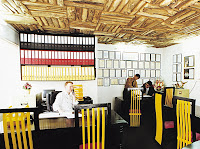 |
| Guests pay a premium for the right presentation. |
Most chefs see a menu as merely a list of their lovingly-crafted dishes with corresponding prices from which a customer chooses and tells the waiter what to bring. Just look at any local Indian restaurant menu to see what I mean. But is it really enough for a business to survive? Or heaven forbid, thrive? Not in this economy.
And since chefs, managers and restaurateurs write them all the time, have they ever asked themselves this simple question: what is a menu?
“The menu is a profoundly powerful sales tool, that allows you to tell your story and encourages people to engage in that experience through the products and services on offer, in exchange for money.”
'Profoundly powerful'
Done well, a menu can change your life. Profound AND Powerful.
'Sales tool'
If it ain’t selling it, then it's being wasted.
'Allows'
By choosing to read your menu, you are given permission to pitch ‘your story'
'Tell your story'
People buy people - remind them why they chose this table instead of cooking at home.
'Engage in that experience'
Sell the sizzle, not the steak - give them something real and personal to talk about.
'products and services'
You sell wine; but guests pay a premium for the right presentation, glassware and service.
'in exchange for money'
 |
| A menu can change your life. |
Not credit. Nor goodwill. Nor for free.
Now consider your menu. From the tactile feel, to the logo design, to the size and weight, to the font size and layout; to the pictorials and artwork; to the language and pace; to the welcoming intro; to the dishes and descriptions; to the prices and terms; and to the promise of more to come… have you answered the four fundamental questions that definition brings up:
- What story are you telling your guests?
- Who are those people that might want to share in that?
- Which products and services can you offer that reflect those values?
- How much can you comfortably charge for those right now?
Get it right, and sales will soar. Get it wrong and all you have on your menu is mediocrity. Is that something you'd order?









